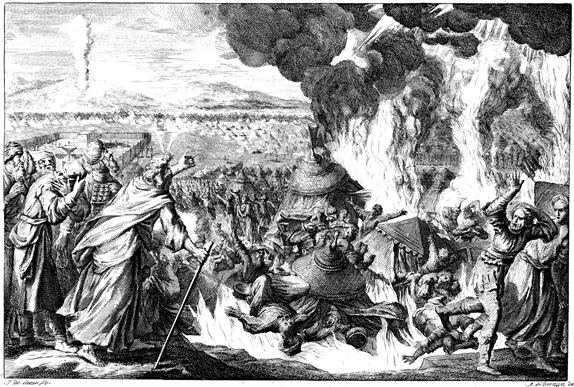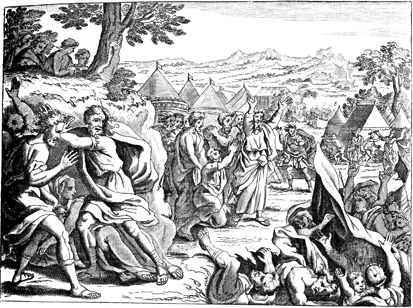The seriousness of sin
Numbers 16:23 Then the LORD said to Moses, 24
"Say to the assembly, 'Move away from the tents of Korah, Dathan and
Abiram.'" 25 Moses got up and went to Dathan and Abiram, and
the elders of Israel
A teacher told me once about a
student who was misbehaving in her classroom. The teacher gently warned the
student that she would count to five, and if the student continued in her
misbehavior, then the student’s name would be written on the board. (Having
your name written on the board as a young student can be pretty traumatic.) She
ignored the warning and continued to misbehave. The teacher wrote her name on
the board. The student began to bawl! It seemed to be a bit of an overreaction,
so the teacher asked her about it. The student said, “I didn’t think you were
actually going to do what you said! My mom counts to five all the time but
doesn’t do anything!”
This child overreacted to
discipline because she wasn’t used to discipline. Our children don’t know how
to react to discipline, because we are so poor in correcting, rebuking and
training our children. Instead of using proper discipline to correct misbehavior
with a timeout, grounding or even a spanking, we mollycoddle, we pamper, we
indulge, we cater to our children’s every whims, we try to be their friends and
make them like us instead of being their parents and make them respect us.
The fall-out from a lack of
discipline is seen in the ever-increasing number of broken homes, academic
failure, vandalism, resentment, out-of-control teenagers, and emotional
despair. If discipline is not applied from the very beginning, the end results
can be eternally disastrous.
On the other hand, proper
discipline encourages order. Along with order comes productivity,
self-confidence, growing in the favor of God and people, and the ability to
raise a family in happiness and security.
This morning we hear a story
that may bother some of us. God appears very harsh. His punishment is very
strong. His actions put authority behind the words of Jesus in the Gospel
lesson: “Repent or perish” (Luke 13:3)! God expects respect! He expects respect
for His chosen leaders and called workers. And if He does not get that respect,
then we’d better watch out. God takes sin very seriously, even if we don’t.
The children of Israel Israel Israel
They accused Moses of deliberately
exposing them to a slow death in the desert. They insisted that Moses was a
tyrant who made them do their bidding while he lived a life of ease. They
sneeringly implied that Moses had not kept his promises about the Promised
Land. Although this rebellion was openly directed at Moses and Aaron, it shows
clearly that their sin was really a rebellion against God.
The next day, the company of
Korah appeared with their censers for burning incense for worship (which only
the high priest was supposed to have). They stood with Moses and Aaron in the
doorway of the Tabernacle. But the whole congregation of Israelites assembled
as well, for in the meantime Korah and his men had stirred up all the people,
so that they sided with the rebels against Moses, Aaron and the Lord.
But at once the Lord showed
that He would intervene on behalf of His chosen servants. The glory-cloud of
His visible presence appeared among the assembly. The Lord ordered Moses and
Aaron to put a distance between themselves and the people, because He was going
to consume them instantly. Moses and Aaron acted as mediators, prostrating
themselves before the Lord and pleading, “O God, … will you be angry with the
entire assembly when only one man sins?” (Even though the whole nation was
guilty of the sin of rebellion.)
The Lord commanded Moses to
order the people away from the tents of Korah, Dathan, and Abiram. As this
order was being carried out, Dathan and Abiram with their families stood at the
doorway of their tents, as if to challenge Moses to punish their rebellion
(16:12-14). (It should be noted though, that the sons of Korah are not
mentioned, and their silence says much. They did not approve of their father’s
apostasy. They later wrote hymns recorded in the book of Psalms.)
Then came a brand new judgment
upon those who had made themselves enemies against God. The ground yawned open
and swallowed whole Korah, Dathan and Abiram, their household, their followers
and their possessions. They were literally wiped off the face of the earth. Meanwhile,
back at the Tabernacle, the Lord acted in judgment upon the 250 leaders who
were offering incense. Flames shot out from the “glory of the Lord” of the
pillar of cloud. It was more powerful than a laser beam or nuclear blast.
Nothing remained of their bodies to bury. The only remnants were the censers
they had used - for were consecrated to the Lord for His Tabernacle.
The punishment of Miriam’s leprosy
her complaints against her brother’s leadership; the punishment of stoning
Achan for stealing bounty from the defeat of Jericho; and the punishment of
total annihilation of Korah and the rebels demonstrates that God acts justly.
God takes sin seriously, even if we don’t.
God is patient with sinners,
but we should never mistake His overlooking of our sin as acceptance of the
sin. He is merely allowing us time to repent. We dare never consider God as
some white-haired grandfather in the sky who will always give, but never scold;
who will always comfort, but never correct; who will always be patient and loving
and accepting. No, He is a Father who disciplines those He loves (Hebrews
12:6).
How often don’t we take our
sin lightly? We indulge our sinful nature. We think, “I’ll go ahead and sin now
because I can just be forgiven later.” We believe, “God won’t punish me for my
actions because He already punished His Son in my place.” We mistake our
freedom from sin as a license to sin. We consider our harsh tongues as
expressing our feelings; our gossip as gaining consensus; our unfinished
homework assignments as just laziness; our lack of worship as me-time; our
outbursts of anger as blowing off steam; etc. We don’t see these things as sins
– sins which hurt, sins which kill, sins which damn to hell.
I believe the hymnwriter puts
it well as he points to the cross of Jesus:
“If you think of sin but lightly
Nor suppose the evil great,
Here you see its nature rightly,
Here its guilt may estimate.
Mark the sacrifice appointed;
See who bears the awful load –
‘Tis the Word, the Lord’s
Anointed,
Son of Man and Son of God.” (Christian Worship: 127 –
“Stricken, Smitten, and Afflicted”)
If you think your sin is not
serious, then look at God’s Son on the cross. Look at Him! Every thought, every
word, every action you commit in sin is just another stripe on His back, another
thorn in His brow, another nail in His hands, another punch in His gut, another
slap in His face, another spear in His heart.
We should never ask: “Why does
God deal so harshly with sin?” Instead, we should thank God that He has not
dealt with us harshly, as our sins deserve. Every time you put down a classmate
on the bus, God should send a lighting bolt from heaven right on your head.
Every time you have an angry outburst at your children, God should call down
fire from heaven to consume you. Every time you complain or are bitter or are
resentful, God should open up the earth to swallow you whole.
But God doesn’t do that. And
why not? Because He did all that to Jesus.
As Moses and Aaron pleaded for
the sinful Israelites and served as their mediators, so Jesus is our mediator
between a righteous and just God and we wretched sinners. He intervened to save
us. Jesus was stricken, smitten and afflicted so we would not be. The crown of
thorns on His head, purges the sinful thoughts from our minds. The nails in His
hands and feet sanctify our hands and feet for service to Him. The cup of God’s
wrath was poured out on Him so God’s grace could be poured out on us. The
stripes across His back removed the punishment we deserved. The blood that
poured from His riven side washes away our continual, pet sins.
Jesus is the refuge of the
lost. He is the Lamb of God who was wounded for sinners. He is the sacrifice
who cancels our guilt. Our sins pierced Him, but the deepest stroke that
pierced Him was the stroke that God’s Justice gave. In His love, God punished
His Son so that He would not have to punish us. But in His love, God will still
discipline us.
I had a member in Kentucky
Where is the grace in this
story of Korah’s rebellion? The grace is shown in that God counted to more than
two with Korah and his followers. He gave them to the next day to repent and
return. Instead Korah used that time to gain more rebels. Dathan and Abiram
stood stubbornly in front of their tents expecting nothing to happen to them.
Grace was shown in Moses and Aaron pleading for the people. Grace was God not
punishing the whole assembly, for they, too, had grumbled and complained
against God and His chosen leaders.
Grace is shown to us every day
we remain alive. Grace is God holding off His anger by pouring out that anger
on His Son. Grace is God allowing us time to repent and return to Him.
But grace is also shown in the
way God disciplines those He loves. All of us know children who are wild and
out of control. That’s because their parents refuse or are unable to properly
discipline their children. We also know children who are well-mannered and
well-behaved. That’s because their parents do the difficult job of correcting,
rebuking and disciplining. The bad parents may appear loving, lenient and tolerant,
but that leniency allows their children to disregard rules and disrespect
authority. By not being able to say no, those parents are indulging their
children’s sinful nature. In the end, those parents are actually being unloving
to their children.
The good parents may appear
hard and harsh, quick with a stern look or a snap of the fingers or a swat on
the behind. But their intolerance for misbehavior and their zealous devotion to
God’s commandments are actually very loving. They carry out the hard job of
disciplining their children so those children are kind and gentle and a benefit
to society. They take their children’s sin seriously.
God is a perfect Parent. He
will be respected – either through Law or Gospel! God knows exactly how to
discipline those He loves. That’s because He is serious about sin. And if you
still don’t believe He’s serious, then just look at His Son hanging on the
cross. There is seriousness. There is salvation. Amen.



Comments
Post a Comment